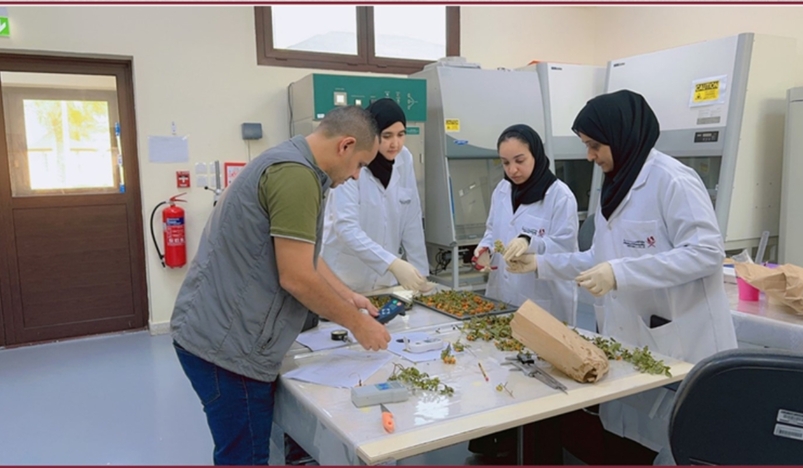
The State of Qatar, represented by the Ministry of Municipality, is celebrating World Soil Day, that annually falls on December 5 each year.
Held under the theme of rural soil care: measurement, monitoring, and management, the celebration intends to shine a spotlight on the importance of accurate data and information to figure out soil characteristics, as well as support insightful decisions on the sustainable management of soil, thereby fostering food security.
The State of Qatar's participation in marking this day stems from the Qatar National Vision 2030, that seeks to achieve sustainable development, including the preservation of environment and natural resources, as long as the priority given to soil is a core part of environment protection, in addition to achieving sustainability in utilizing natural resources and reducing desertification.
In addition, the Ministry of Municipality, represented by the Department of Agricultural Research, has accomplished concrete results in protecting soil and lands in Qatar from wind-induced degeneration, erosion and desertification through protecting the plant genetic resources and biodiversity, as well as the national Gene Bank.
Director of the Agricultural Research Department at the Ministry of Municipality, Hamad Saket Al Shammari, stated that the Qatari genetic seed bank currently includes 1,138 plant entries, comprising many local wild plants such as Al Ghaf Sidr, Awsaj, and others, as well as plants related to food and agriculture, such as tomatoes, corn, onions, et al.
He highlighted that the key objective of this bank is to preserve seeds that are compatible with the soil and climate conditions in Qatar after conducting the necessary research on them.
Additionally, the Department of Agricultural Research is making significant efforts in scientific research and development to optimize soil quality and increase its productivity, while leveraging various technologies, especially in light of the focus on achieving and sustaining food security, added Al Shammari.
He highlighted several critical successes that have been made to protect biodiversity and soil in Qatar, in collaboration with the Ministry of Environment and Climate Change, since 2015, such as the protection of the Qatari Al Ghaf at Al Ghaf meadow in the north of Qatar, where an overall research was conducted on the site to receive the essential imprimaturs to embark on implementing an integrated plan that included fencing the area and cleaning it from harmful and invasive plants, primarily the Mesquite plant, in addition to exploring the most appropriate scientific techniques to propagate Al Ghaf seeds and recultivate its offshoots These efforts resulted in restoring the site's standard environmental criteria, where the vegetation cover density and soil coverage with plants and plant remains have increased in the summer, and subsequently the wild Al Ghaf trees have developed, with an increase in their annual seed production, after they were in a state of severe degeneration prior to taking the protection decision, Al Shammari outlined.
Aisha Dasmal Al Kuwari from the Department of Agricultural Research asserted that since its inception in 2012, the Qatar Gene Bank has succeeded in studying and collating approximately 70% of local plant species in the form of seeds, along with herbaceous plants and DNA samples, emphasizing that plant genetic resources are one of the national assets with strategic and economic value since directly or indirectly support human livelihoods and ensure stability by providing food, medicine, fodder, fibers, clothing, shelter, and energy, in addition to their crucial role in conserving the environment and preventing soil degradation and erosion.
The Gene Bank pursues a sophisticated system to manage and document genetic resources in compliance with international standards. Overall data for each type is logged in Qatar's Gene Bank's international database, which was established in 2015 in collaboration with the Arab Organization for Agricultural Development (AOAD), highlighted by Al Kuwari.
For his part, Biotechnology & Genetic Resources Expert at the Ministry of Municipality, Dr. Elsayed M. Elazazi, indicated that the Qatari Gene Bank compiled 1,138 samples from various sites across the State of Qatar that included over 9 million seeds saved under standard conditions, either for long or short term preservation mechanism, representing over 150 species and nearly 200 unique species, with a special focus on vital domestic types that prevent land degeneration and enhance their sustainable management.
Noteworthy, the State of Qatar has successfully activated the law of the unified system for the management of plant genetic resources proposed by Qatar for the Gulf Cooperation Council (GCC) states to protect the rights of GCC states over their local plants and regulate the mechanism for sharing genetic resources among the countries.
(QNA)
.jpg)
Qatar Secures Place Among the World's Top 10 Wealthiest Nations
.jpg)
Hamad International Airport Witnesses Record Increase in Passenger Traffic

Saudi Arabia: Any visa holder can now perform Umrah

What are Qatar's Labour Laws on Annual Leave?
Leave a comment